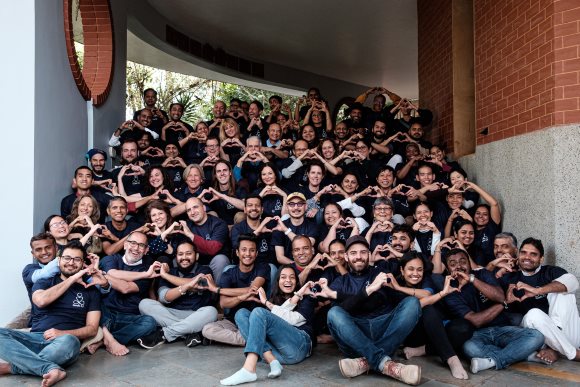Gandhi 3.0 Retreat, 2020
Jan 21, 2020 | permalink
“I don’t know how I’m here, when my calendar for 2024 is getting quite full,” the chairman of a Bank ponders. The truth is that no one knows why they are here. And yet, the truth is also that everyone knows why they are here. In Dubai, a mom returned from her prayers and declared to her daughter, “You’ll get the visa.” In Missouri, a church minister said, “Every cell of my body, immediately and emphatically said yes. My mind is now busy crafting up justifications.” When a legendary entrepreneur from Tokyo gently mentioned, “Gandhi invited me”, no one realized that last May he would wake up each morning with Sanskrit chants on his lips.
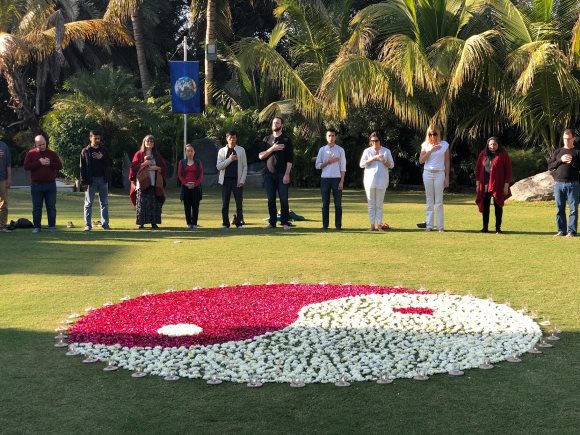
Welcome to Gandhi 3.0 retreat. Many to many, leadership to laddership, broadcast to deepcast. Balancing the telescopic with the microscopic, the idea was to offer individual effort for awakening collective emergence.
40 luminaries of love, 30 volunteers, 10 days.
As Tim would later share, “We come from a dozen countries, but are citizens of the world. Our ages range from teens to 70s, but we’re as old as the cosmos -- 13.7 billion years old. We come from all faiths, but share one humanity. We come from 26 different professions, but all work with a heart of service. From all streams of life, we have come together with no agenda but love.”
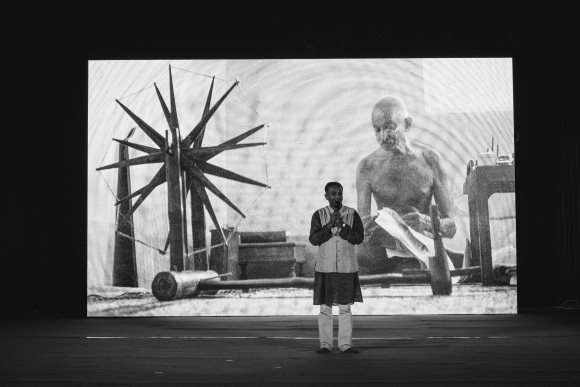
When people lead with the universal, the synergy of their uniqueness naturally flows across all chasms. Not vice-versa.
President Obama’s general counsel who had drafted constitutions of entire countries is doing dishes with an anarchist that walked to the border of US-Mexico to plant a one Earth Flag. An investor trying to create a trillion-dollar impact fund is riveted by a conversation with two permaculturists from Vietnam who flatly state, “We live on 2 dollars a day, and we don’t want the third dollar.” A mother homeschooling her daughter is cracking jokes with a man who has an engineering school named after him at UC Berkeley. A fellow with a private jet is moved to tears hearing about the story of a young man at a call center who refused an unethical bonus. A former interrogator for the CIA bows down to a gentleman who was born at the Gandhi Ashram. Founder of one of the biggest social networks in the world takes a selfie with a nun from the Philippines.
For the first five days, we had optional immersions. The formal retreat would start in the subsequent five days. As things start to flow, though, all those lines get completely blurred -- lines between start and end, between participants and volunteers, between inner transformation and external impact, between fierce urgency of the now and radical trust in the ripple effect.
Take a look at the spontaneously created immersion video of the first five days:
“What was an unexpected encounter that altered the direction of your life?” That’s how we opened. On the second day, we spoke about the shift from transaction to relationships. The following day was themed around building bridges, as we ultimately crescendoed into oneness.
Moments of grace, unexpected encounters, don’t just change our lives -- they shape our lives. Among Dacher’s many accomplishments of cultural alchemy, he metamorphosed Facebook’s like button into a range of emoticons. That sounds fairly significant, yet when he reflects on an unexpected encounter, he remembers snow geese in Bhutan. “On a five thousand mile migration journey, hundreds of these snow geese went 6 kilometers out of their path to pay circumambulate a monastery in Bhutan. Seeing it as it happened, I had goosebumps, chills. I was sobbing. It changed my life.”
As we allow such grace to shape us, it deepens the way in which we relate in everyday life.
“People want me to write a book on finance, but what I really want to do is write a book on love,” Mark shares. For the past 13 years of his 31-year marriage, his wife has had deteriorating dementia. “I feel so grateful, because it’s like I’m on a first date everyday of my life. I’ve learned non-intellectual ways of loving that I didn’t know existed.” His external work is about decoupling power from money, and its path runs through relationships. “At one point, we brought borrowers and lenders together to determine their own interest rate. Once they got connected -- I have seen it with my own eyes -- borrowers would even offer higher interest when they felt that lenders needed it! We moved from interest to being interested.”
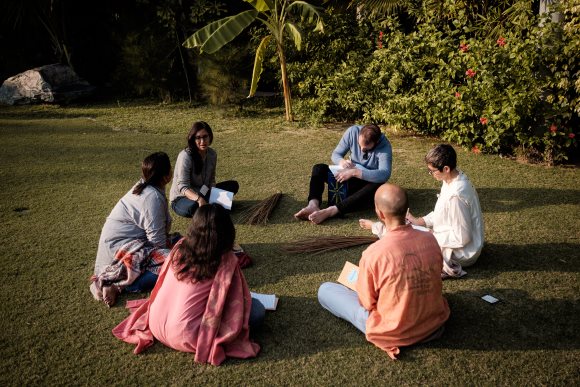
Stephanie, a member of Parliament in Austria, remembered how it was an incredible act of generosity from an elder member of Parliament, who withdrew her name from candidacy to “give a chance to a younger person.” That eventually led to her friend getting elected, who, just a few weeks ago, became the first refugee in Austrian history to become a minister.
As we were reflecting on the role of deeper relationships, we were imbued in a context of radical kindness. If someone somewhere overhears a way to make someone’s day, there’s a “secret service” that would immediately mobilize into action. A woman was in tears that her best friend just had a miscarriage, and in her room was an anonymous love letter to that unborn child. Sallyann mentioned how this was the only time in her life that she was away on her mother’s birthday, and lo and behold, everyone organized for a birthday song. Yuko remembered spinning cotton as a young mother in Japan, and the next morning, a spinning machine was at her doorstep. Compassion Intelligence Agency -- a different kind of CIA. :)
After a series of dramatic inner experiences, in such a sacred space, Bijan shared with tears: “Because of all of you, I am a better Muslim today.” Sister Migs, likewise, used to go to mass every morning and said, “Today, as Abid was driving me back from Church, I noticed a physically disabled Jain pilgrim being carried by others so he can continue his pilgrimage. It touched me deeply.” And it touched us deeply that a Muslim man was driving a Christian nun, and they were both reflecting on the sincerity of a Jain pilgrim.
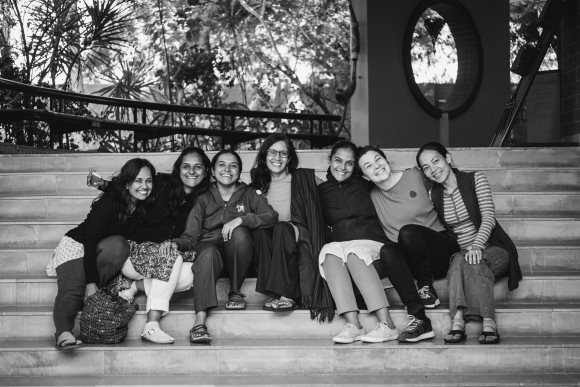
The following day, we took on the juicy intersection between love and power. As every Harvard lawyer gets asked, what are the “wise restraints that make men free?” After a compelling presentation on the neuroscience of power, one participant asked: “I’m convinced that power corrupts, but what if I have power? If I give it away, am I not just corrupting someone else? What is the responsible way to hold power, without being disconnected with love?”

On two of the evenings, we had community nights where we invited some guest speakers and performances, alongside our community friends from around the country. On one of the nights, we had the remarkable privilege of listening to stories from Gandhi’s grandson -- Rajmohan Gandhi -- alongside various other talks and Nimo’s musical premiere! On another night, Prahlad Tipanya-ji wowed us with songs of Kabir at the Gandhi Ashram, while kids offered a remarkable Jai Jagat performance. By the end, we were all up in a giant group embrace, that reminded us about the power of building bridges and stepping into our oneness.
Courtesy of all-nighters by our media team, we already had a video before we had left the building:
Before one of the nights, we held a brainstorm about the Olympics. One of our participants happened to be an architect for the summer Olympics in Tokyo, and he asked us, “How can we bring these values onto the world stage?” In place of each country using the platform to showcase their own uniqueness, can Japan start a trend that leads with our shared universality? What if refugees lead with the flag? What would it take to design for compassion, over competition? How do we engage with 100 thousand volunteers in a way that sustains after the Olympics? Can we create a global arc with organizers of the Paris Olympics in 2024 and LA Olympics in 2028? It sparked a phenomenal series of ideas that is still continuing in various directions.
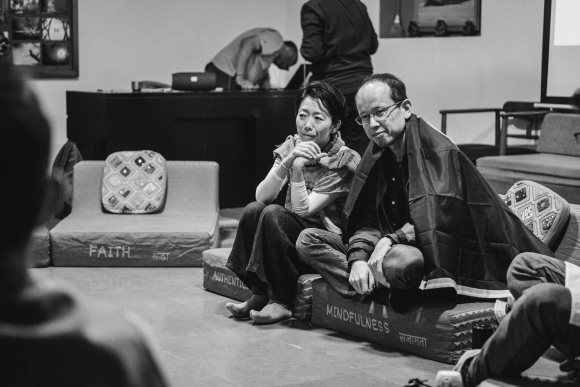
In such a setting, people think differently, they bridge easily, and they start to love effortlessly. It’s profoundly transformative. “I’ve been waiting my whole life for this,” Tsering said without hesitation. She wasn’t the only one to articulate that sense. “The retreat cracked me open and I never want to close up again,” David reflected.
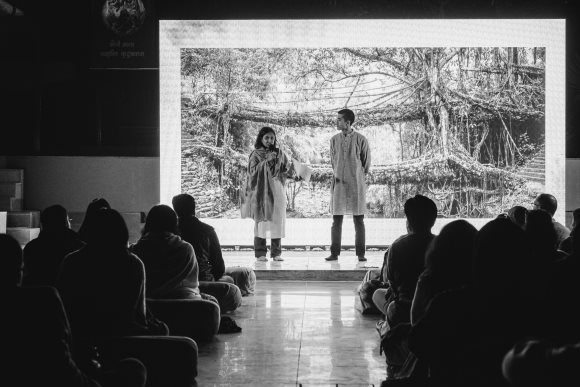
Instead of delivering a talk on technology, Evan opted instead to offer a poem he had written for his 15 month old. “Only problem is that I don’t have an ending,” he joked. He shared an eloquent poem about the chasm between a gardener and a builder, and as he reached the climax of their polarity, he said, “Just an hour ago, I think I’ve found the ending.” And he read that ending:
“A key for a tree sounds good to me.
But what if first, we sit and have tea?
I’d like to know you before the day ends,
For I cannot go on without a good friend.”
The builder felt her heart melting, and she replied:
“Oh gardener thank you that puts me at ease
I am so sad that I killed all our trees.
I thought if you saw, that my house was snug,
It might mean that you’d come and give me a hug.”
This stunned the gardener.
So she’d really wanted to be friends all along?
He said to her:
“Oh builder, about the trees, please don’t feel sad!
Indeed your words fill me, and make me feel glad.
My friends the animals are quite wise
And they tell me that everything dies.
What matters is not death or life,
But rather that we get to live without strife.”
And the gardener replied:
“Then about our quarrel, let’s find a dove,
And instead let us live a life founded in love.”
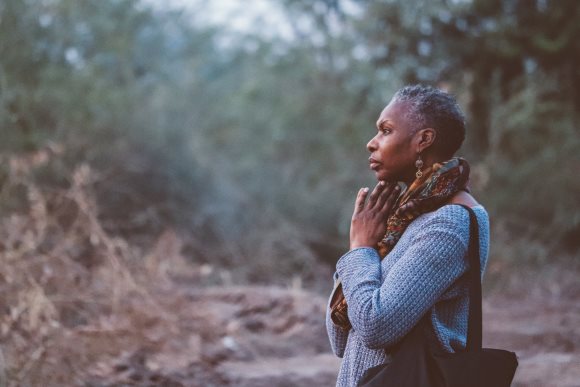
During one of the visits to Gandhi’s prayer ground, Paulette had a profound experience. With deep poise and elegance, she later shared it from the very stage of the Gandhi Ashram: “I closed my eyes for a minute of silence and had a vision of Gandhi. ‘You must stand up,’ he said while lifting me up by the arm. ‘So many of us are behind you.’ While it was an experience I can’t forget for the rest of my life, I sense it was a message from Gandhi to all of us. The forces of love are eager to add wind beneath our sails.”
